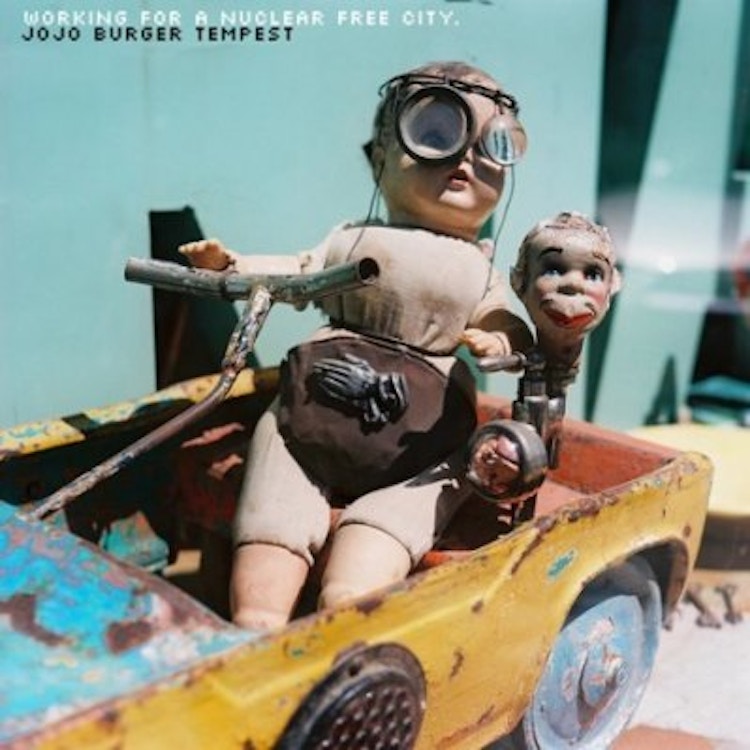Working for a Nuclear Free City – Jojo Burger Tempest
"Jojo Burger Tempest"

“…an album should be a document of what a band has been doing over a certain period of time. And almost everything should be included. Like it or not.” So said Gary McClure of Working for a Nuclear Free City in a memorable quote that has been doing the rounds recently. The eclectic Manchester band has taken this mantra to heart on their third album, the inclusion of “almost everything” resulting in Jojo Burger Tempest clocking in barely under the length of a football match – mercifully minus half time. But that does not mean that the record is a messy affair. It has meant a sprawl across two discs, however, the second of which WFANFC have used to enclose a single 33-minute electro-symphony of dubious merit. But we’ll get to that.
WFANFC’s last outing was a double too, an exhausting hour-and-three-quarters tour of myriad disparate styles which was robbed of listenability by the bizarre decision to shuffle new material with previous work included for the benefit of new listeners, especially in the US. This time around the five-piece have included solely new material which if we leave the epic title track aside for a moment leaves us with a much more manageable 55-minute album to enjoy. Stylistically this new material is a little more cohesive than last time around, but this can still be a dizzying journey; acoustic and electric guitars duel with bleepy synths on ‘Inokashira Park’, while pretty piano dances over hushed beats on ‘A Black Square With Four Yellow Stars’.
As before, much of the album is instrumental. Perhaps the best of these pieces is ‘B.A.R.R.Y.’, on which a shredded confetti of glockenspiel falls on a floor of pulsating drums as heavenly strings look on. It is the sound of something breaking through the clouds to the sun beyond; it is as much a highlight of this album as the 70s car-chase-soundtrack of ‘Innocence’ was a highlight of the band’s debut. The sheer vast difference in style between the two tracks underlines the fact that that was then, this is now – the gulf in style between ‘B.A.R.R.Y.’ and most other tracks on this album underscores the fact that one thing which has not changed for WFANFC is their willingness to try just about anything.
When vocals do get a look-in, they are generally hushed and relatively unobtrusive, as on the jovial and relaxed ‘Little Lenin’. McClure’s lyrics are often pretty repetitious, furthering the impression that these are collective trances rather than songs in the conventional sense. Generally they lull, calm, soothe – they are far from what Greg Kot calls rock n’ roll’s “amplified personality”, one of many reasons why “post-rock” is a deeply unsatisfactory term for the band’s music; indeed, on much of Jojo Burger Tempest they have shed rock aesthetic altogether – they are a kind of experimental electronica-dominated collective.
At first glance one glaring rock trope remains. That 33-minute closing title track on the second disc superficially recalls similar efforts to create side-long symphonies on albums by the likes of Yes, Jethro Tull, and Emerson, Lake and Palmer in the 70s. However, WFANFC have been quick to point out that the work is really more of a mix, more indebted to DJ sessions, and that it compiles miscellaneous abortive song fragments. Unfortunately WFANFC are no Beatles, and this technique leaves the track an aimless self-indulgence, something of an anchor appended to the end of an otherwise consistently interesting, if inconsistently brilliant, album.
Get the Best Fit take on the week in music direct to your inbox every Friday

Prima Queen
The Prize

Femi Kuti
Journey Through Life

Sunflower Bean
Mortal Primetime





